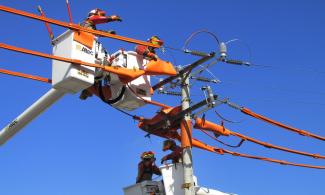First Responder: Sara Villa
Engendering Industries helps a female champion at DELSUR navigate a national gender equality emergency in El Salvador
When a storm takes down a power line overnight, a utility’s emergency response team springs into action. The scene is chaotic. It's dark. Sparks and flames spew from live wires ensnared in fallen trees. A misstep could be life threatening. But Sara Margarita Villa Contreras from El Salvador’s Energy Company, DELSUR, thrives in this environment.
Frontline utility jobs are considered among the deadliest in the world. The typical emergency response crew is a boys club that is intimidating for women to join at best, and impossible for women to join at worst. In 2019, DELSUR partnered with USAID’s Engendering Industries program to advance gender equality across its emergency response teams, paving the way for Sara Contreras to become the first woman in the utility’s history to work in an emergency response role. The program supports companies like DELSUR to use a framework of best practices to advance gender equality across the employee lifecycle.
“In El Salvador, women face obstacles in our careers,” Sara said. In El Salvador, the onslaught of obstacles to female workforce participation amounts to an economic emergency for women. Only 49 percent of women participate in the workforce compared to 80 percent of men. The majority of non working women cite the high rate of generalized violence, as well as gender-based violence, as the reason they stay home. Additionally, women in El Salvador who do work make only 66 percent of what men typically earn.
Benevolent sexism is also an issue that Sara has experienced throughout her career. Companies use it to discourage her and other women from assuming technical roles in the energy sector, arguing that women should be protected from the physical risks associated with frontline roles as well as with high levels of generalized violence and gender-based violence.

Primary Text“The Engendering Industries program made me see how important it is that the company officially declare its stance on sexual harassment, adopt a zero-tolerance [policy], and provide a safe workplace where women know that DELSUR formally endorses gender equality among its employees,” Sara said.
The Engendering Industries Approach to Advancing Gender Equality
Advancing equality in a male-dominated company is similar to navigating an electrical emergency: many factors must be addressed at once, shifting winds of opinion could threaten the operation, and there is risk of harm if you take the wrong step. Engendering Industries supports partners to collect and use company data and a framework of best practices at each stage of the employee lifecycle to advance gender equality. A dedicated Engendering Industries coach provides technical support, helping partners implement changes, track progress, and identify threats and remaining gaps.
“Change was not easy,” says Jasmine Boehm, DELSUR’s change management coach. “The team dealt with several setbacks. But they did an excellent job being strategic and persevered to shift the mindset at the company and ensure women are considered for all jobs at the organization.”
DELSUR Takes Action to Advance Gender Equality
A first step in the Engendering Industries approach is supporting partners to identify a unique business case for advancing gender equality at their company. This is a strategic maneuver that demonstrates how gender equality will improve the company’s bottom line, which generates leadership buy-in. In 2019, nearly a quarter of DELSUR’s employees were nearing retirement age. The company needed to widen its talent pool to fill vacant roles, and fast. Additionally, the company lacked policies codifying its support for gender equality in the company’s male-dominated environment, including a sexual harassment policy.
With support from Engendering Industries, DELSUR also incorporated gender equality targets into the company’s five-year workplan. While Sara and her colleagues endeavored to make their staff composition more gender-equitable, they were also focused on getting more women into technical roles.
“On the surface, half of Del Sur’s workforce is women, but when you look closer, you see that the women are all working in sales and customer service,” she explained. “This is a trend that starts in university. The majority of those who enroll in engineering careers are men.”

Primary Text“I am proud of our work,” Sara beamed. “[Gender equality] is not only a benefit for women but also for men and for our whole society.”
To effectively diversify its talent, DELSUR sought to understand how many women were in the pipeline for technical careers in the power sector in El Salvador. With a grant from Engendering Industries in 2021, DELSUR conducted a talent pool analysis, collecting data on women in STEM. The study found that, while 21.1 percent of the women studying STEM fields were positioned to pursue an energy career, most characterized technical jobs as “masculine.” Many female students reported that their families questioned why they enrolled in courses meant for men.
While the study did not paint a rosy picture, the data helped DELSUR chart a path forward. In 2022, the company organized a roundtable discussion, inviting every energy company in the country to build a roadmap to improve gender equity. Representatives from 29 organizations gathered and committed to establishing an industry-wide equality committee.
“The Engendering Industries program made me see how important it is that the company officially declare its stance on sexual harassment, adopt a zero-tolerance [policy], and provide a safe workplace where women know that DELSUR formally endorses gender equality among its employees,” Sara said.
In 2020, Sara organized a sexual harassment training for the company’s ethics committee and human resources department. A year later, the CEO signed and adopted the company’s first sexual harassment policy, which shifted the conversation about gender equality and positioned DELSUR as an employer of choice for women.
Gender Equality Results at DELSUR
Equality is gaining momentum at DELSUR. While it may take years to fully bridge the gender gap, every year more women at DELSUR are hired to work on the front lines. Using the Engendering Industries approach, the utility is starting to see results. In 2021, 40 percent of the company’s technical hires were women and the promotion rate was 50 percent for female employees.
“I am proud of our work,” Sara beamed. “[Gender equality] is not only a benefit for women but also for men and for our whole society.”
